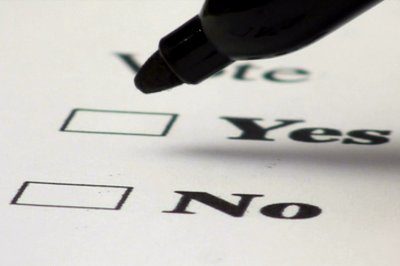
The Center for Electoral Science intends to enter a professionally-produced video about Approval voting in a video contest sponsored by a democracy-advocacy organization. Presumably all of the contestant videos will be seen by many people. And of course the winning video will get even more attention. Whether or not the Approval video wins, its production and entry into this contest will bring Approval to more people’s attention. Maybe it will be the nudge that is needed to soon create some constituency-demand to replace Plurality with Approval.
– by Democracy Chronicles writer Michael Ossipoff
The Center for Electoral Science will enter a video about approval voting advocates in a coming contest
Dr. Steven Brams, NYU political scientist and pioneer of approval voting, has endorsed the Center:
“I heartily endorse the efforts of The Center for Election Science to apply scientific methods to the study of voting procedures and to assess their applicability to real-world elections. Unlike many academics, members of the Center have been willing to advise election officials and politicians on the implementation of better procedures, which helps advance the practice as well as the theory of democracy.”
The Center urges supporters to “put their foot down against what is clearly established as a hideous voting method.” The president of the Center, Aaron Hamlin, stated: “Plurality Voting has held its dysfunctional reign for ages. It’s time the world knew about Approval Voting.” Here is the message from the Center for Electoral Science:
The Center for Election Science Launches Fundraiser to Fix Our Out-of-Date Voting Method
The Center for Election Science, a nonpartisan 501(c)3 nonprofit, just launched a provocative campaign on Indiegogo. They’re fundraising to create a video on an alternative voting method called Approval Voting. The Center maintains that the current method we use, Plurality Voting, “is deeply flawed and out of date.” The campaign’s first $1,000 came within 24 hours. The Center describes our vote-for-one Plurality system as “the worst voting method ever invented.” It then explains why:
- Not expressive, at all.
- The vote splits between similar candidates (terrible for primaries).
- Moderate candidates get squeezed out, even when they’re popular (bad winners).
- Spoiler alert! Candidates with little support can throw the election.
- Fearing a wasted vote causes dishonest voting.
- New candidates with different ideas get artificially low support because voters fear wasting their vote. Policy discussion suffers as a result.
The Center goes on to cite Voting Power and Procedure, an international electoral research group from the London School of Economics and Political Science. In 2011, Voting Power and Procedure brought together 22 voting theory specialists. And not a single one of these voting specialists chose Plurality Voting. The method they did prefer, however, was Approval Voting. And that’s what The Center for Election Science proposes.
Approval Voting, like traditional Plurality, is used to elect a single winner. But instead of being limited to picking one option, voters are permitted to choose as many as they want. There’s no ranking. And it’s still most votes wins. The Center lists why Approval Voting should replace our current Plurality method:
- Expressive.
- Works on current voting machines.
- So easy! No runoff or complicated ranking.
- Perfectly constitutional. Does not violate “one person, one vote.”
- You can support groups of similar candidates (great for primaries).
- Candidates with broad support are preferred (better winners).
- No “spoilers”! Voters can hedge their bets by adding another vote for a more viable candidate.
- Vote your favorite(s) every single time without repercussion. This is one of very few voting methods that permits this.
- More honest voting allows candidates to get a more accurate reflection of support. This helps new candidates, especially third parties and independents.
The Center admits the toughest obstacle Approval Voting faces is that it’s newer and lesser known outside the academic community. And it’s that recognition that has inspired the fundraising campaign. It has chosen to use Thought Bubble, a video animation company, to create the video. The Center has timed its fundraising to coincide with an internet competition hosted by Looking@Democracy, funded by The MacArthur Foundation.
If timely funded, the Center will enter the competition. The contest is for short media content that “tells how we might together strengthen American democracy.” And this gives the Center an opportunity to increase exposure and place Approval Voting before the contest’s reform-oriented audience. The top prize of $25K also presents opportunity for future programs.
About: The Center for Election Science is a nonpartisan 501(c)3 nonprofit dedicated to election-related scholarship. It educates the general public and advocates election systems that most benefit the public good.
The Center for Election Science: electology.org
Social Media:
Facebook: https://www.facebook.com/electology
Twitter: https://twitter.com/electionscience
Tumblr: https://electology.tumblr.com/
Media Contacts:
Aaron Hamlin, Esq.
President, Director
859-445-2199
aaronhamlin@electology.org
Eric Sanders
Director
917-974-3510
eric@electology.org
Leave a Reply